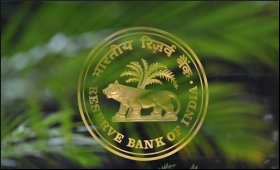|
|
|

|
RBI keeps lending rates intact, remains accommodative
|
|

|
|
| Top Stories |
 |
|
|
|
SME Times News Bureau | 08 Dec, 2021
To support a durable as well as lasting economic recovery amid concerns
over the Omicron variant of coronavirus, the Reserve Bank of India on
Wednesday retained its key lending rates along with the growth-oriented
accommodative stance during the penultimate monetary policy review of
FY22.
The Monetary Policy Committee (MPC) of India's central bank
voted to maintain the repo rate, or short-term lending rate, for
commercial banks at 4 per cent.
Repo Rate (RR) is the rate at
which the RBI lends money to commercial banks or financial institutions
against government securities.
The reverse repo rate was also
kept unchanged at 3.35 per cent, and the marginal standing facility
(MSF) rate and the 'Bank Rate' at 4.25 per cent.
It was widely expected that MPC would hold rates along with the accommodative stance.
In
a virtual address after the MPC's bi-monthly meet, RBI Governor
Shaktikanta Das said that economic recovery disrupted by the second wave
of the pandemic is gaining traction.
However, this recovery is
still not strong enough to be self-sustaining and durable, thereby,
supportive policy measures such as accommodative stance are required, he
added.
With the RBI retaining India's FY22 GDP growth projection
at 9.5 per cent, Das pointed out that GDP is expected to grow at 6.6
per cent in Q3, 6 per cent in Q4, 17.2 per cent in Q1FY23, and at 7.8
per cent for Q2FY23.
"Overall, the recovery that had been
interrupted by the second wave of the pandemic is regaining traction,
but it is not yet strong enough to be self-sustaining and durable. This
underscores the vital importance of continued policy support," he said.
"Downside
risks to the outlook have risen with the emergence of Omicron and
renewed surges of Covid-19 infections in a number of countries.
"Furthermore,
the CPI-based inflation is projected at 5.3 per cent for FY22. The CPI
inflation is expected to ease to 5 per cent in Q1FY23 and stay at 5 per
cent in Q2FY23.
"In the current situation, it is important to
keep inflation aligned with the target while focusing on a robust growth
recovery," Das said.
"Simultaneously, the Reserve Bank remains
cognisant of the need to ensure that financial conditions are rebalanced
in a systematic, calibrated and well-telegraphed manner while
preventing build-up of financial stability risks," he added.
India Inc welcomed the MPC's move.
"The
status quo on the repo rate while continuing an accommodative stance
was broadly expected especially in light of the latest global
developments and the emergence of a new variant of concern," said FICCI
President Uday Shankar.
"The latter poses a major downside risk
going ahead and it remains extremely critical to maintain caution. In
this context, RBI's policy statement is reassuring."
State Bank
of India Chairman Dinesh Khara said: "The RBI policy announcement
addresses monetary policy and money separately, with the rate-setting
divorced from calibrated liquidity management. The growth and inflation
outlook look delicately poised even as the Omicron virus threat has put
an element of uncertainty all around.
"The announcement regarding
the capital infusion in overseas branches without prior approval of the
RBI will bring in operational and seamless flexibility. The decision to
review the payment landscape and further fine-tuning UPI transfer for
small value transactions could act as an enabler of mass digitisation.
The clarification regarding the transition from 'LIBOR to ARR' is also a
welcome move."
PHD Chamber of Commerce and Industry President
Pradeep Multani said the accommodative policy stance at this juncture
would not only pave the way for a double digit GDP growth in the current
year 2021-22, but will also help in creating a strong, sustainable and
vibrant economy going forward.
Assocham Secretary General Deepak
Sood said: "We completely agree with the statement of Governor
Shaktikanta Das that even as the economic recovery has been regaining
traction, it is not yet strong enough to be self-sustaining and
durable."
"Hence, continuing monetary policy support to the
growth momentum is of utmost importance, especially when there are signs
of pick-up in private investment."
|
|
|
| |
|
|
|
|
|
|
|
|
|
|
|
|
|
|
| |
| Customs Exchange Rates |
| Currency |
Import |
Export |
US Dollar
|
84.35
|
82.60 |
UK Pound
|
106.35
|
102.90 |
Euro
|
92.50
|
89.35 |
| Japanese
Yen |
55.05 |
53.40 |
| As on 12 Oct, 2024 |
|
|
| Daily Poll |
 |
 |
| Will the new MSME credit assessment model simplify financing? |
|
|
|
|
|
| Commented Stories |
 |
|
|
|
|
|
| |
|